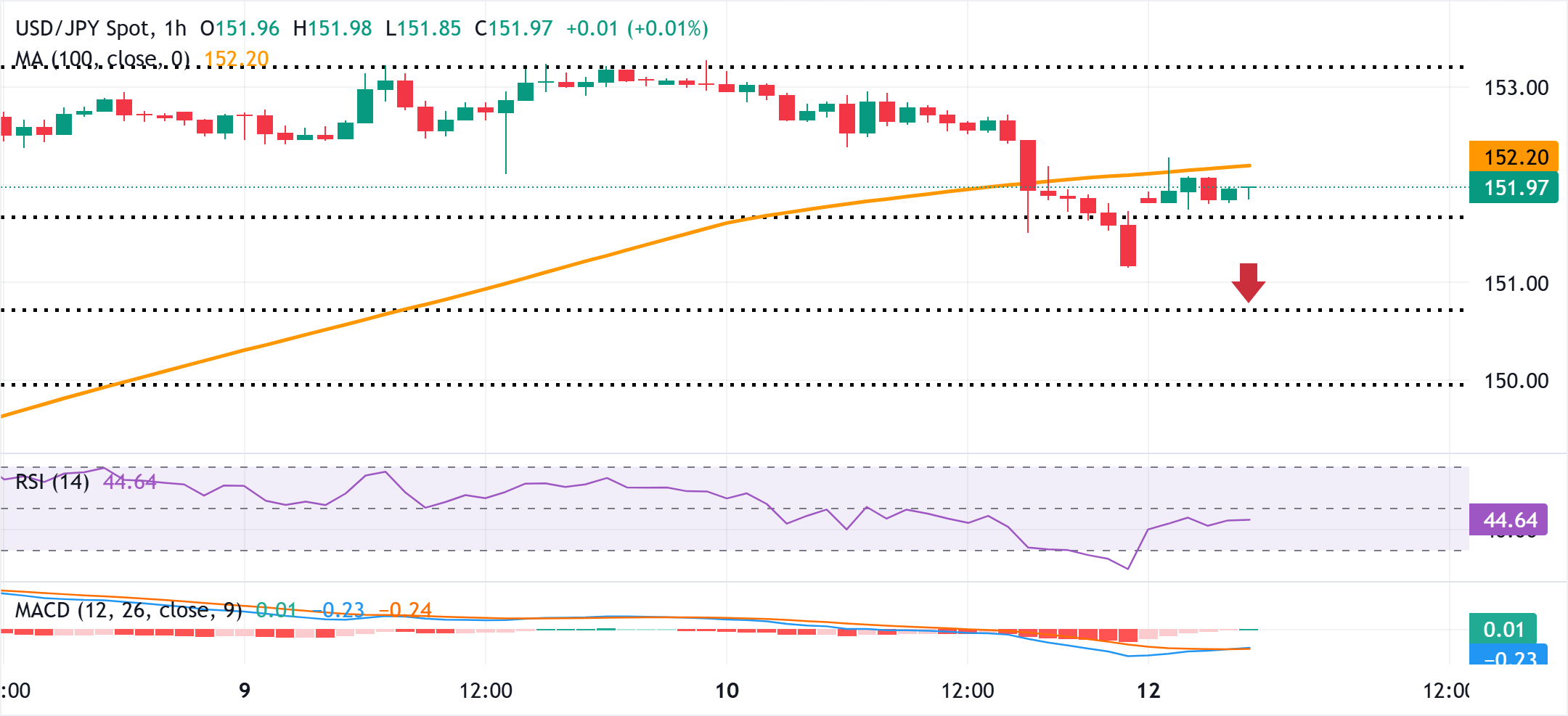Created
: 2025.10.13














![]() 2025.10.13 12:02
2025.10.13 12:02
The Japanese Yen (JPY) kicks off the new week on a downbeat note in reaction to US President Donald Trump's pivot on China tariffs. This, in turn, boosts investors' confidence, which, along with domestic political turmoil, fails to assist the JPY to capitalize on Friday's goodish recovery move against its American counterpart from the lowest level since February 13. The USD/JPY pair, however, struggles to build on the Asian session gains beyond the 152.00 mark amid a subdued US Dollar (USD) price action.
Moreover, the divergent Bank of Japan (BoJ)-US Federal Reserve (Fed) policy expectations contribute to capping the USD/JPY pair amid relatively thin liquidity on the back of a bank holiday in Japan and the US. Nevertheless, the fundamental backdrop seems tilted in favor of the JPY bears, suggesting that any attempted recovery could be seen as a selling opportunity and is likely to remain capped. However, speculations that authorities could intervene to stem the JPY weakness warrant caution for bears.

From a technical perspective, the USD/JPY pair shows some resilience below the 23.6% Fibonacci retracement level of the recent surge from the monthly low amid positive oscillators on the daily chart. That said, Friday's breakdown through the 100-hour Simple Moving Average (SMA) warrants some caution for bulls. Hence, it will be prudent to wait for a sustained move beyond the 152.20 area (100-hour SMA) before positioning for any further intraday appreciating move. Spot prices might then climb to the 152.70-152.75 intermediate hurdle and reclaim the 153.00 mark before aiming to test the eighth-month high, around the 153.25-153.30 region, touched on Friday.
On the flip side, Friday's swing low, around the 151.15 region, could act as an immediate support. Some follow-through selling below the 151.00 round figure could drag the USD/JPY pair to the 38.2% Fibo. retracement level, around the 150.70 region. The corrective decline could extend further towards the 150.00 psychological mark. The latter also represents a confluence support - comprising the 200-hour SMA and the 50% Fibo. retracement level - and should act as a key pivotal point.
In the world of financial jargon the two widely used terms "risk-on" and "risk off'' refer to the level of risk that investors are willing to stomach during the period referenced. In a "risk-on" market, investors are optimistic about the future and more willing to buy risky assets. In a "risk-off" market investors start to 'play it safe' because they are worried about the future, and therefore buy less risky assets that are more certain of bringing a return, even if it is relatively modest.
Typically, during periods of "risk-on", stock markets will rise, most commodities - except Gold - will also gain in value, since they benefit from a positive growth outlook. The currencies of nations that are heavy commodity exporters strengthen because of increased demand, and Cryptocurrencies rise. In a "risk-off" market, Bonds go up - especially major government Bonds - Gold shines, and safe-haven currencies such as the Japanese Yen, Swiss Franc and US Dollar all benefit.
The Australian Dollar (AUD), the Canadian Dollar (CAD), the New Zealand Dollar (NZD) and minor FX like the Ruble (RUB) and the South African Rand (ZAR), all tend to rise in markets that are "risk-on". This is because the economies of these currencies are heavily reliant on commodity exports for growth, and commodities tend to rise in price during risk-on periods. This is because investors foresee greater demand for raw materials in the future due to heightened economic activity.
The major currencies that tend to rise during periods of "risk-off" are the US Dollar (USD), the Japanese Yen (JPY) and the Swiss Franc (CHF). The US Dollar, because it is the world's reserve currency, and because in times of crisis investors buy US government debt, which is seen as safe because the largest economy in the world is unlikely to default. The Yen, from increased demand for Japanese government bonds, because a high proportion are held by domestic investors who are unlikely to dump them - even in a crisis. The Swiss Franc, because strict Swiss banking laws offer investors enhanced capital protection.
![]()
Created
: 2025.10.13
![]()
Last updated
: 2025.10.13

FXStreet is a forex information website, delivering market analysis and news articles 24/7.
It features a number of articles contributed by well-known analysts, in addition to the ones by its editorial team.
Founded in 2000 by Francesc Riverola, a Spanish economist, it has grown to become a world-renowned information website.
We hope you find this article useful. Any comments or suggestions will be greatly appreciated.
We are also looking for writers with extensive experience in forex and crypto to join us.
please contact us at [email protected].
Disclaimer:
All information and content provided on this website is provided for informational purposes only and is not intended to solicit any investment. Although all efforts are made in order to ensure that the information is correct, no guarantee is provided for the accuracy of any content on this website. Any decision made shall be the responsibility of the investor and Myforex does not take any responsibility whatsoever regarding the use of any information provided herein.
The content provided on this website belongs to Myforex and, where stated, the relevant licensors. All rights are reserved by Myforex and the relevant licensors, and no content of this website, whether in full or in part, shall be copied or displayed elsewhere without the explicit written permission of the relevant copyright holder. If you wish to use any part of the content provided on this website, please ensure that you contact Myforex.
Myforex uses cookies to improve the convenience and functionality of this website. This website may include cookies not only by us but also by third parties (advertisers, log analysts, etc.) for the purpose of tracking the activities of users. Cookie policy